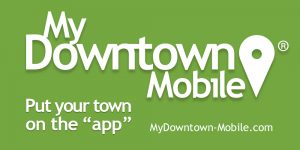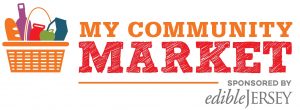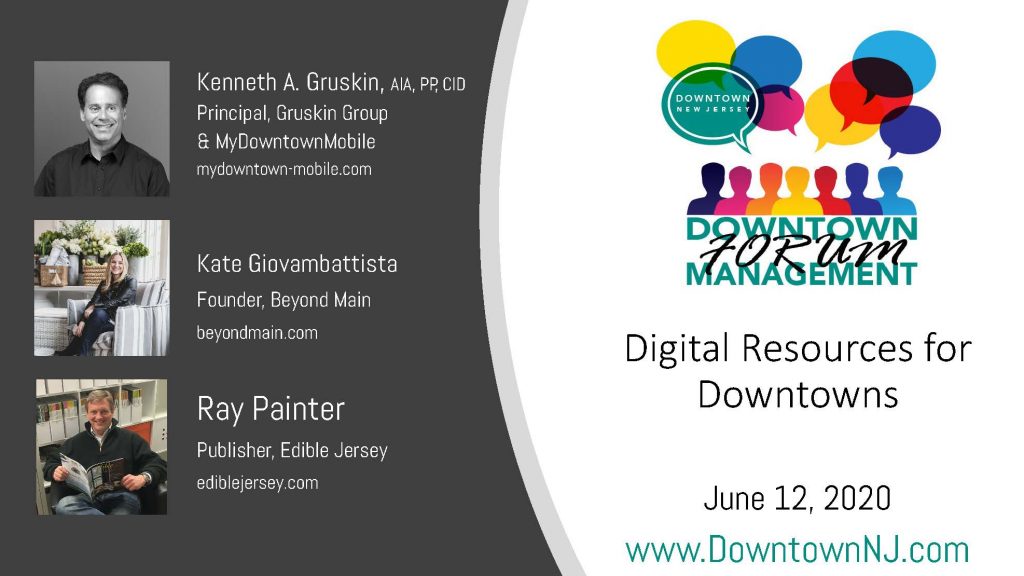Digital Resources for Downtowns
Courtenay D. Mercer, PP, AICP
Executive Director, Downtown New Jersey
Rachael Thompson Panik
Associate Planner, Mercer Planning Associates
June 12, 2020
Downtown New Jersey provided a series of virtual opportunities for downtown managers, economic development professionals, and public officials to exchange ideas about best practices related to downtown economic development in light of the COVID-19 crisis.
Now more than ever, “going digital” is necessary to stay relevant and present in the consumer’s mind. At this forum, we heard about a few of the digital resources that our members have found valuable for both their downtown and their businesses.
Panelists:
Kenneth A. Gruskin, AIA, PP, CID, Principal, Gruskin Group Ken provided an overview of MyDowntown Mobile® – A branded service offering of Gruskin Group™, and shared how towns have been using it to effectively communicate with their community during the pandemic.
Ken provided an overview of MyDowntown Mobile® – A branded service offering of Gruskin Group™, and shared how towns have been using it to effectively communicate with their community during the pandemic.
Kate Giovambattista, Founder, Beyond Main Kate provided an overview of Beyond Main, an online local marketplace for downtown districts and small businesses.
Kate provided an overview of Beyond Main, an online local marketplace for downtown districts and small businesses.
Ray Painter, Publisher, Edible Jersey Ray provided an overview of Edible Jersey‘s partnership with Local Line to create My Community Market for farmers’ market vendors to open online stores. He also talked about an opportunity to promote your downtown restaurants in the next issue of Edible Jersey.
Ray provided an overview of Edible Jersey‘s partnership with Local Line to create My Community Market for farmers’ market vendors to open online stores. He also talked about an opportunity to promote your downtown restaurants in the next issue of Edible Jersey.
View Powerpoint>
Mobile Apps Keep Downtowns Open and Connect the Community
Kenneth Gruskin of the Gruskin Group discussed the benefits of mobile device applications to downtowns as local retail owners try to adapt to changing conditions during the COVID-19 pandemic. The Gruskin Group’s platform called My Downtown Mobile is a customizable app for downtowns to help people stay connected; and now, as our understanding of what it means to be a closely connected community has changed so dramatically, it is more important than ever to connect people to places, information, and events. COVID-19 has made placemaking for downtowns challenging, but there are things that can be done to help.Traditionally, towns would create a sense of community without apps via public parks, gathering spaces, or neighborhood streets. Now with smartphones as prevalent as they are, people are already accustomed to connecting with their community and with others in an online format. Right now, up to 80% of people in New Jersey have a smartphone. BIDs and SIDs have an opportunity to capitalize on this market of people who all have access to smart phones to manage their brands and share information.The way people are interacting with their local vendors and information sources has changed already since the shutdown began in March. Given rapidly evolving information and restrictions related to the pandemic, popularity is rising for local news sites. People want to be connected to what is happening in their community locally. And, more people are open to shopping online. There is already huge growth for these online platforms for local shopping. Communities themselves, though, often do not have their own app, and there is an opportunity for downtown organizations to take advantage of this platform to better support downtown businesses.Having a centralized app for a downtown allows organizations to direct online shoppers to specific businesses, rather than allowing search engines to funnel business elsewhere outside of the community. Also, an app allows for a consolidated digital expression of their town. It is another opportunity to expand typical branding to capture tone, adding nuance to what is great about living in a certain place. In addition, apps can provide a centralized location to collect many different kinds of information, such as COVID-19 guidelines, updates to businesses’ services, virtual or in-person events, local retailers’ deals, and local news.There are several considerations to keep in mind when utilizing an app for a downtown. First, it is crucial that the app stay up to date. If users begin to feel like the app’s information is out of date, they will stop using it immediately. Also, the app should have corresponding scheduled push notifications. These notifications must be balanced; too many notifications can be frustrating for users, but regular reminders can help people use the app more frequently and know about updates when they happen. In addition, local businesses must be engaged in the app’s services; they must provide relevant information about store hours, services, and location at a minimum, but they can make better use of the app if they provide deals that users can take advantage of only through the platform. Finally, local events must be current and updated at very frequent intervals. This likely requires work from a full- or part-time staff member of a downtown organization. Kenneth estimates that this type of work takes about 3 -7 hours per month.Online Marketplaces Expand Market Potential
Beyond Main, co-founded by Kate Giovambattista, is a New Jersey based startup that launched about a year ago. Beyond Main’s mission is helping people live better locally and helping communities thrive. Their business serves to redirect online retail back into small businesses in local downtowns by aggregating information into a single, convenient space.Long before the COVID-19 pandemic hit, retail marketing and sales experienced a renaissance as online shopping transformed the industry and consumer behavior. Local businesses often struggle to compete in this new era. Beyond Main sees the value in these small businesses in the ways they contribute to vibrant and sustainable places to live and work. Small businesses employ 48% of the private job sector. They also contribute back to their communities both in community support and through their taxes. To help these businesses maintain their vital role in communities in the future, Beyond Main created a technology solution to help businesses adapt and compete in the rapidly changing markets.Presently, around two-thirds of small businesses are not ecommerce enabled, even though customers browse online resources to find local businesses. Often small businesses need help filling this gap, and the pandemic has accelerated this issue, as suddenly many businesses have no choice but to be online.To put into place e-commerce effectively for a small business, local businesses need integration across multiple channels – online platforms, marketing, social media, and brick and mortar. Beyond Main helps here. They provide low-cost, turnkey operational tools that help businesses create safe online shopping opportunities. This allows convenient options for consumers to search, discover, experience, and support local businesses.As community organizations consider what types of applications are worth the investment, Kate encourages leaders to think long-term; what capabilities will you be using now, and what capabilities will you continue to need in the next 5 or 10 years? The Beyond Main offerings allow small business owners to manage their businesses from anywhere through user-friendly, low-cost software. It allows allows for marketing and get the business found by more customers and the community.Kate provides high-level guidance for making this type of technology and the work of creating a e-commerce focused environment in downtown worth the investment. First, she encourages collaboration with the small business communities and outside vendors is paramount. Also, training and education matters as people who are less familiar with this type technology may be hesitant to adapt to this new market. Finally, communicating and marketing of new technology is key to making it successful in your community.Digital Marketing for Farmers Markets & Restaurants
Edible Jersey is a well-loved organization in the state that celebrates love of food and passion for community. Launched in 2007, their mission is to connect good lovers to the best resources they can find throughout the state by helping them explore where their food comes from, how it’s produced, and who makes it. They publish their magazine five times a year, reaching over 100,000 people each year who are passionate about local food. They also have regular e-newsletters, social media channels, and regular e-blasts.Ray highlighted two of Edible Jersey’s initiatives that are especially relevant to communities during the pandemic.My Community Market
Edible Jersey is all about food and community, so farmers markets are at the heart of what they love doing and telling others about. COVID19 has impacted farmers markets everywhere (see previous Downtown New Jersey Forum on farmer’s markets). Edible Jersey cares about helping markets be successful, even if people cannot gather together in close proximity. Loss of livelihood for vendors that depend so much on farmers would be tragic, and some communities have sculpted parts of their identities around markets. Edible Jersey already had an ecommerce site in progress, but to help farmers and markets during these unforeseen and unprecedented times, they accelerated its development to create mycommunitymarketplace.com. At this site, people can go online and buy from vendors and pick up their goods at the market in partnership with a company called Local Line. Benefits for consumers allow for quicker pickup without spending too much time at the market, and it connects farmers to part of their livelihoods.NJ Dining Destination Guide and Restaurant Survival Guide
Another group who has been harshly impacted by social distancing requirements during the pandemic are New Jersey restaurants, which Edible Jersey feels play an important part in the community. For years, their high summer issue of Edible Jersey Magazine has a provided a guide designed to help people eat and drink locally. This year, the guide will have two components – a Restaurant Survival Guide and a Dining Destination Guide. The Restaurant Survival Guide coming in August 2020, will look similar to what these issues have looked like in past years, but this year, Edible Jersey will give complimentary listings with any restaurant that has partnered with Edible Jersey in the last two years. There will also be a restaurant promotional package for advertising, with a significant discount and a much lower entry point than in typical advertisements. This will also come with free enhanced listings and free social media posts.The 2020 Destination Dinging Guide will display efforts and include a 60-word writeup, as well as a destination guide for each community participating. This guide will be print and online all year. Participants will also get their own social media post, as well as being included in e-blasts and other social media pushes that Edible New Jersey does.Discussion
- Orlando Cruz shared an update from Downtown Paterson. As non-essential businesses begin to open, Paterson is now allowing sidewalk sales 7-days a week without a special permit to make room for more socially distant shopping opportunities. This permission extends to restaurants, i.e. they do not have to apply/pay for an outdoor seating permit.
- Courtenay Mercer provided an update about partial and full street closures, noting the NJDOT recently denied Morristown’s request to close Rt 124. She mentioned that the legislature is moving A4190/S2522 along, but it does not address State roads. It also only allows closures for longer than 48 hours from Thursday through Sunday. DNJ continues to follow policy related to use of streets, and will be providing comment to the legislature and NJDOT.
- How are these online platforms helping smaller businesses owners who aren’t as comfortable with online resources? Even if they have great established business, they may not want to use or feel comfortable with online tools.The keys to making these types of investments successful for the small businesses with owners who are less comfortable with applications are simple, clear user interfaces and regular technical support and training. The platform provider can provide different levels of technical support, depending on the packages purchased.
- What are the most pressing issues right now for downtowns?A common issue for downtowns across New Jersey is reopening safely. Safety of customers and workers must be the top priority, and it is challenging to balance that need for safety and also maximize opportunities for businesses to reopen. Also, it has been challenging for small businesses to adjust to rapidly changing requirements and messages coming from state governments. Often these guidelines come down from governments without time for organizations to adjust logistically. There is, then, a need to be nimbler to changing guidelines, requirements, and consumer demands.



